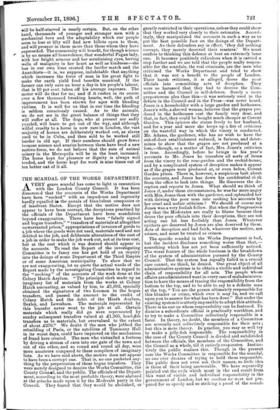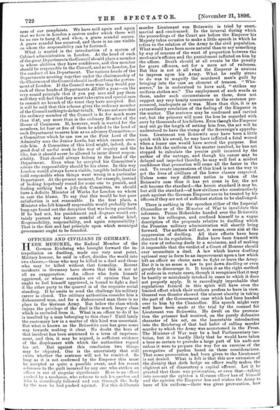THE SCANDAL OF THE WORKS DEPARTMENT.
AVERY grave scandal has come to light in connection with the London County Council. It has been discovered that the accounts of the Works Department have been "cooked" with an impudence and ingenuity hardly equalled is the annals of fraudulent companies or of insolvent States. Except that the motive does not appear to have been corrupt, the deceptions practised by the officials of the Department have been scandalous beyond exaggeration. There have been " falsely signed and bogus transfers," " transfers of materials at altogether unwarranted prices," appropriations of invoices of goods to a job where the goods were not used, materials used and not debited to the job, and deliberate alterations of the cost of a job in order to make the job work out, not at its true cost, but at the cost which it was desired should appear in the accounts. To read the Report of the investigating Committee is to fancy one has got hold of an inquiry into the doings of some Department of the Third Empire or of some American municipality. To show that we are not exaggerating, let us quote the actual words of the Report made by the investigating Committee in regard to the " cooking" of the accounts of the work done at the Colney Hatch Asylum. "The principal clerk made up an imaginary list of materials from the works at Colney Hatch amounting, as valued by him, to £1,892, specially obtained the signatures of two foremen to the bogus transfers, and passed the amount to the credit of Colney Hatch and the debit of the Heath Asylum, Bexley, and Lewisham. The materials represented by this transfer never went to the job at all. Certain materials which really did go were represented by sundry subsequent transfers valued at £1,360, bona fide transfers as to materials, but overvalued to the extent of about £270." We doubt if the men who jobbed the rebuilding of Paris, or the satellites of Tammany Hall in its worst days, could have improved on the mechanism of fraud here created. The men who victualled a fortress by driving a stream of oxen into one gate of the town and out of the other, and so round and round all day, were mere amateurs compared to these compilers of imaginary lists. As wo have said above, the motive does not appear to have been a corrupt one. That is, no one pocketed any- thing by the perpetration of these bogus transfers. They were merely designed to deceive the Works Committee, the County Council, and the public. The officials of the Depart- ment, according to the most probable theory, were alarmed at the attacks made upon it by the Moderate party in the Council. They feared that they would be abolished, or greatly restricted in their operations, unless they could show that they worked very closely to their estimates. Accord- ingly, they manipulated the accounts in such a way as to put the best possible face on the doings of the Depart- ment. As their defenders say in effect, 'they did nothing corrupt, they merely deceived their masters.' We must confess to thinking this defence at best an extremely lame one. It becomes positively ridiculous when it is carried a. step further and we are told that the people really respon- sible for the scandals, the real criminals, are the men who criticised the Works Department and tried to show that it was not a benefit to the people of London. Their harsh criticism, it is alleged, drove the poor officials into committing acts of deception. They were so harassed that they had to deceive the Com- mittee and the Council in self-defence. Surely a more preposterous plea than this—it was seriously used in the debate in the Council and in the Press—was never heard. Jones is a householder with a large garden and hothouses. Jones's wife, a shrewd woman, believes that the grapes pro- duced in the hothouses cost the family very dear, and that, in fact, they could be bought much cheaper at Covent Garden. This opinion she states freely to her husband, and for a year and more she keeps up a fire of criticism on the wasteful way in which the -vinery is conducted. Mr. Adams, the gardener, who has no wish to have the out-of-door establishment reduced, is furious, and deter- mines to show that the grapes are not produced at a. loss,—though, as a matter of fact, Mrs. Jones's criticism is true. Accordingly, before he brings in his year's accounts to Mr. Jones he transfers all sorts of items from the vinery to the rose-garden and the orchid-house, and by a complicated system of deception makes it appear as if the grapes were produced at, or even below, Covent Garden prices. There is, however, a suspicious look about the accounts, and Jones has down his confidential clt rk from the office to look into things. He discovers the de- ception and reports to Jones. What should we think of Jones if, under these circumstances, he was far more angry with Mrs. Jones than with the gardener, and upbraided her with driving the poor man into cooking his accounts by her cruel and unfair criticism ? We should of course say Jones was a very foolish fellow. But when the Progressives say that the Moderates are really to blame because they drove the poor officials into their deceptions, they are not acting one bit less foolishly than Jones. Whatever epithets are deserved by Jones are also deserved by them. Acts of deception and bad faith, whatever the motive, are crimes, and must be treated as crimes.
The specific scandal in the Works Department is bad, but the incident discloses something worse than that,— something which has not yet been sufficiently noticed. The worst feature of the whole business is the breakdown of the system of administration pursued by the County Council. That the system has signally failed in a crucial case cannot, we think, be denied. One great object of all administrative systems is to obtain a visible and individual chain of responsibility for all acts. The people whose affairs are administered want in every case of maladministra- tion to have the means of tracing the responsibility from the bottom to the top, and to be able to say to a definite man at the top, " You are the person ultimately responsible for this blunder or crime, which ever it may be, and we call upon you to answer for what has been done." But under the existing sy stem it is utterly im possible to adopt this attitude. There is no one on whom responsibility can be fastened. To dismiss a subordinate official is practically worthless, and to try to make a Committee collectively responsible is a farce. In theory, no doubt, the members of a Committee are severally and collectively responsible for their acts ; but this is mere theory. In practice, you may as well try to make a jelly-fish responsible. The responsibility in the case of the County Council is divided and subdivided between the officials, the members of the Committee, and the Council as a whole, till it entirely evaporates. Instinc- tively the public realises this. Though in the present case the Works Committee is responsible for the scandal, no one ever dreams of trying to hold them responsible. The public does not even ask their names, so little idea is there of their being answerable. We have repeatedly pointed out the evils which must in the end result from this want of visible and individual responsibility in the government of London, but we confess we were not pre- pared for so speedy and so striking a proof of the sound- ness of our complaints. We have said again and again that we have in London a system under which there will be no one to hang if, and when, a grave scandal occurs. A grave scandal has occurred, and there is no one visible on whom the responsibility can be fastened. What is wanted is the introduction of a system of Cabinet administration in London. At the head of each of the great Departments the Council should place a member in whose abilities they have confidence, and this member should be responsible to the Council, and so to London, for the conduct of his Department. The various heads of the Departments meeting together under the chairmanship of the Chairman of the Council should in effect form the govern- ment of London. If the Council were wise they would pay each of these heads of Departments £2,000 a year—on the very sound principle that if you pay men and pay them well they will feel that they must take extra and special care to commit no breach of the trust they have accepted. But it will be said that this scheme gives the ordinary member of the CounciLnothingto debut to talk. We are not sure that the ordinary member of the Council is fit for much more than that, any more than is the ordinary Member of the House of Commons. If, however, work is wanted for the members, let four or five of them be added to the head of each Department to serve him as an advisory Committee,— .a Committee which he can use as the First Lord of the Admiralty uses the Junior Lords, but which cannot over- ride him. A Committee of this kind might, indeed, do a good deal of useful work in the way of inquiry and the like, but it should never be allowed to incur direct respon- sibility. That should always belong to the head of the Department. Even when he accepted his Committee's advice the responsibility should be his alone. In this way London would always have a visible, tangible individual to hold responsible when things went wrong in a particular Department. At the present moment, for example, instead -of looking hopelessly round for some one to punish, and finding nothing but a jelly-fish Committee, we should have a definite Minister of Works for London on whom to cast the blame. To say that this would be but poor satisfaction is not reasonable. In the first place, a Minister who felt himself responsible would probably have long ago found out the deception that was being practised. If he had not, his punishment and disgrace would cer- tainly prevent any future scandal of a similar kind. Responsibility, responsibility, and again responsibility ! That is the first and last principle upon which municipal government ought to be founded.























































 Previous page
Previous page